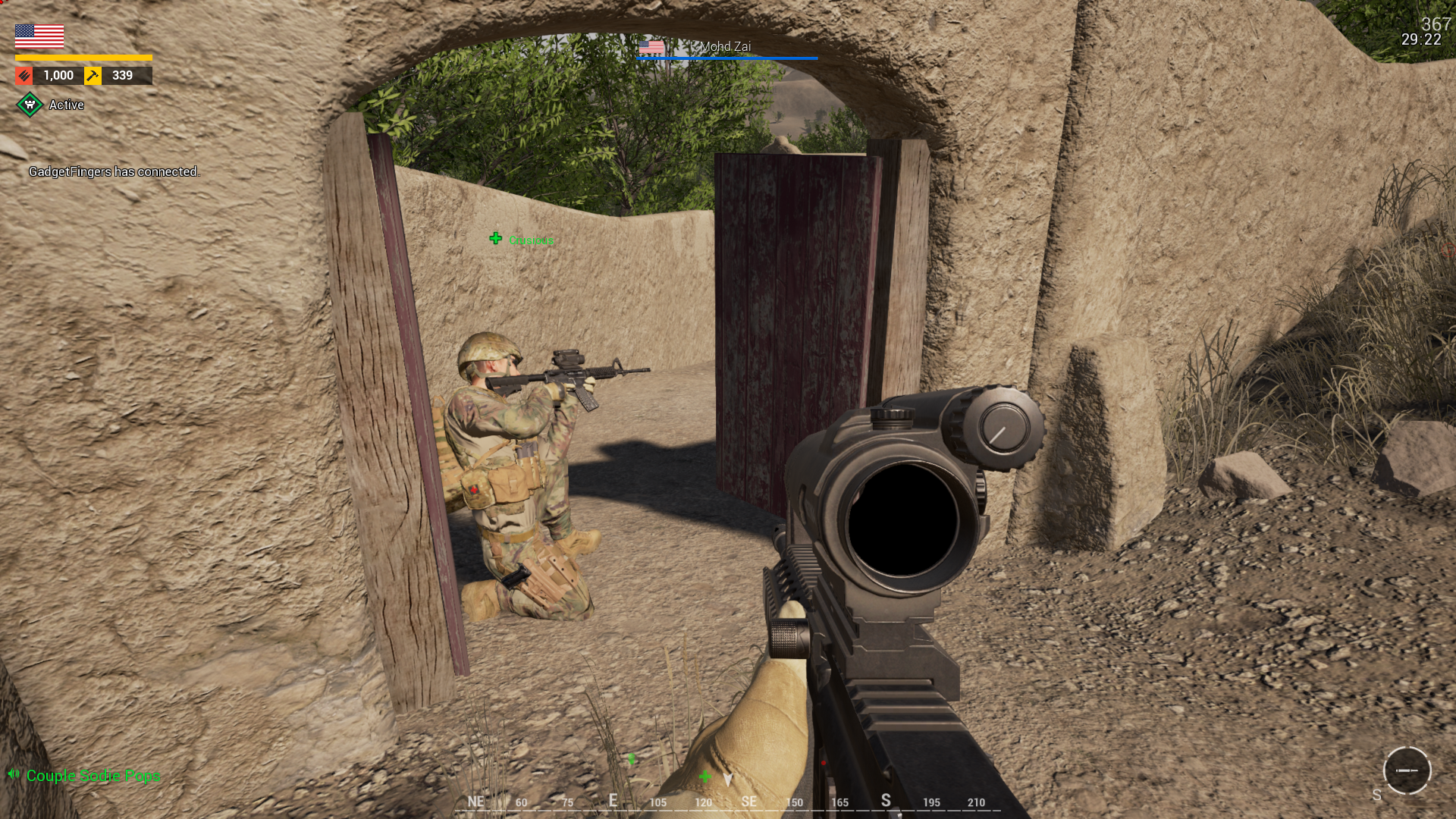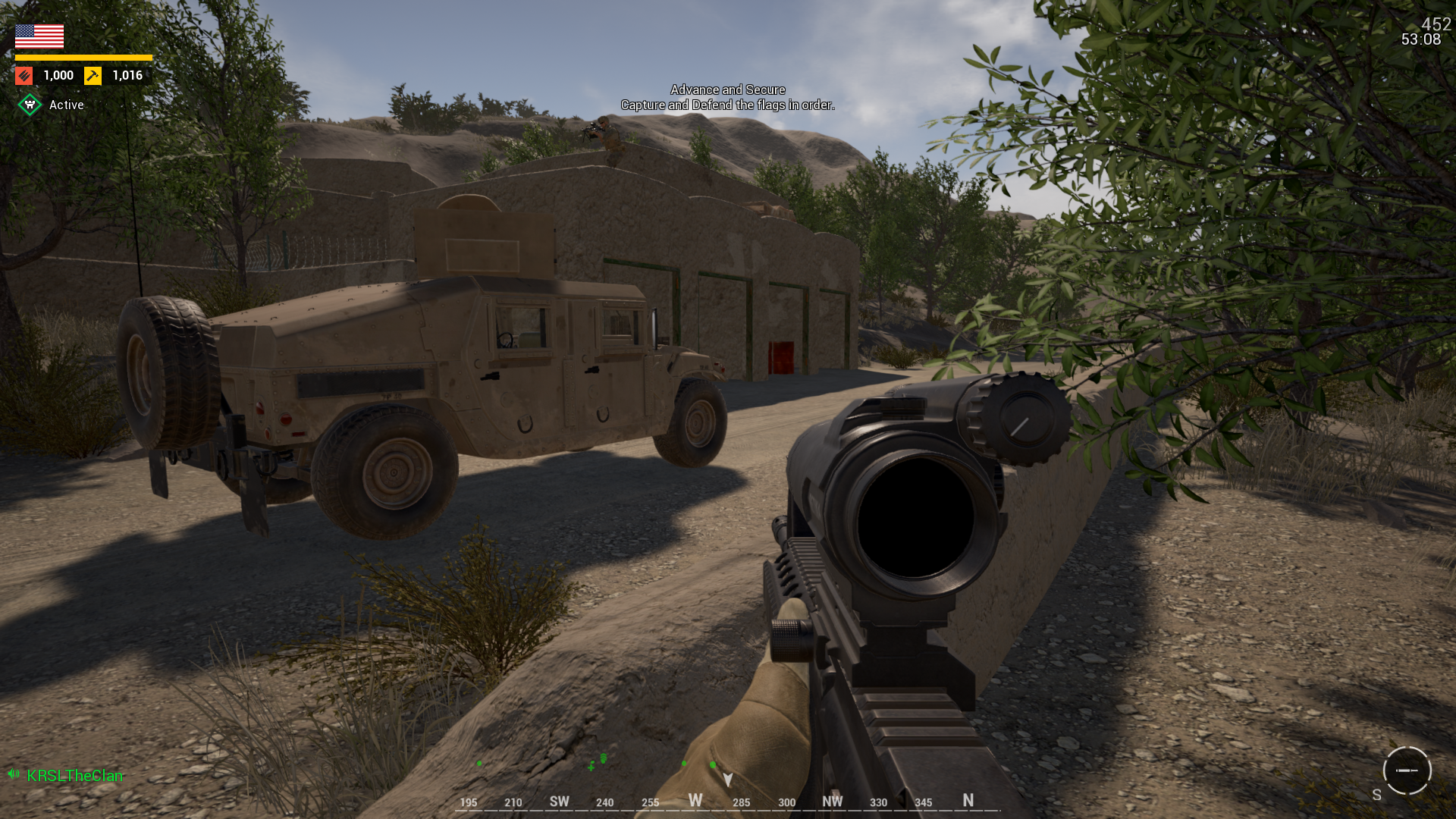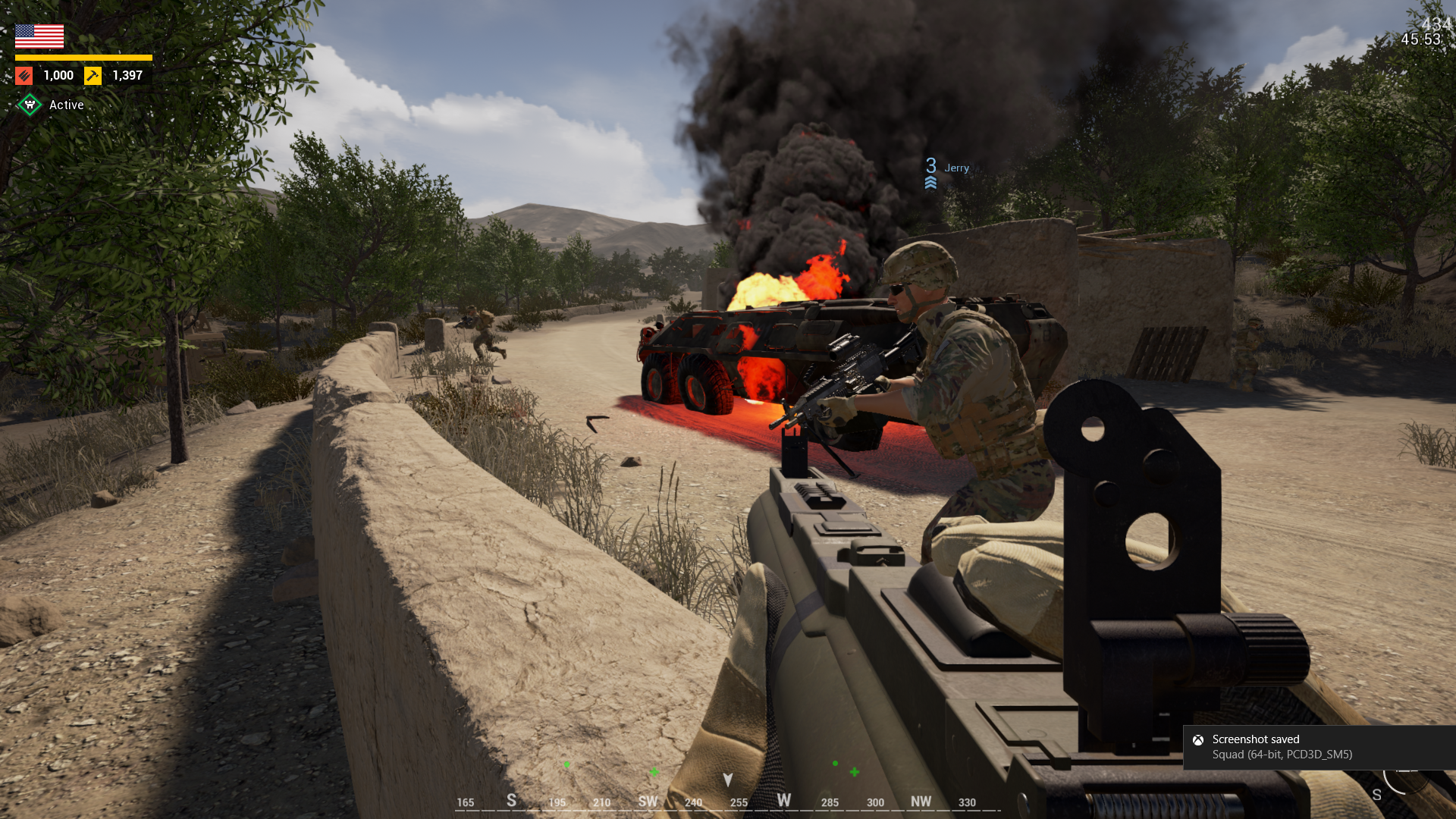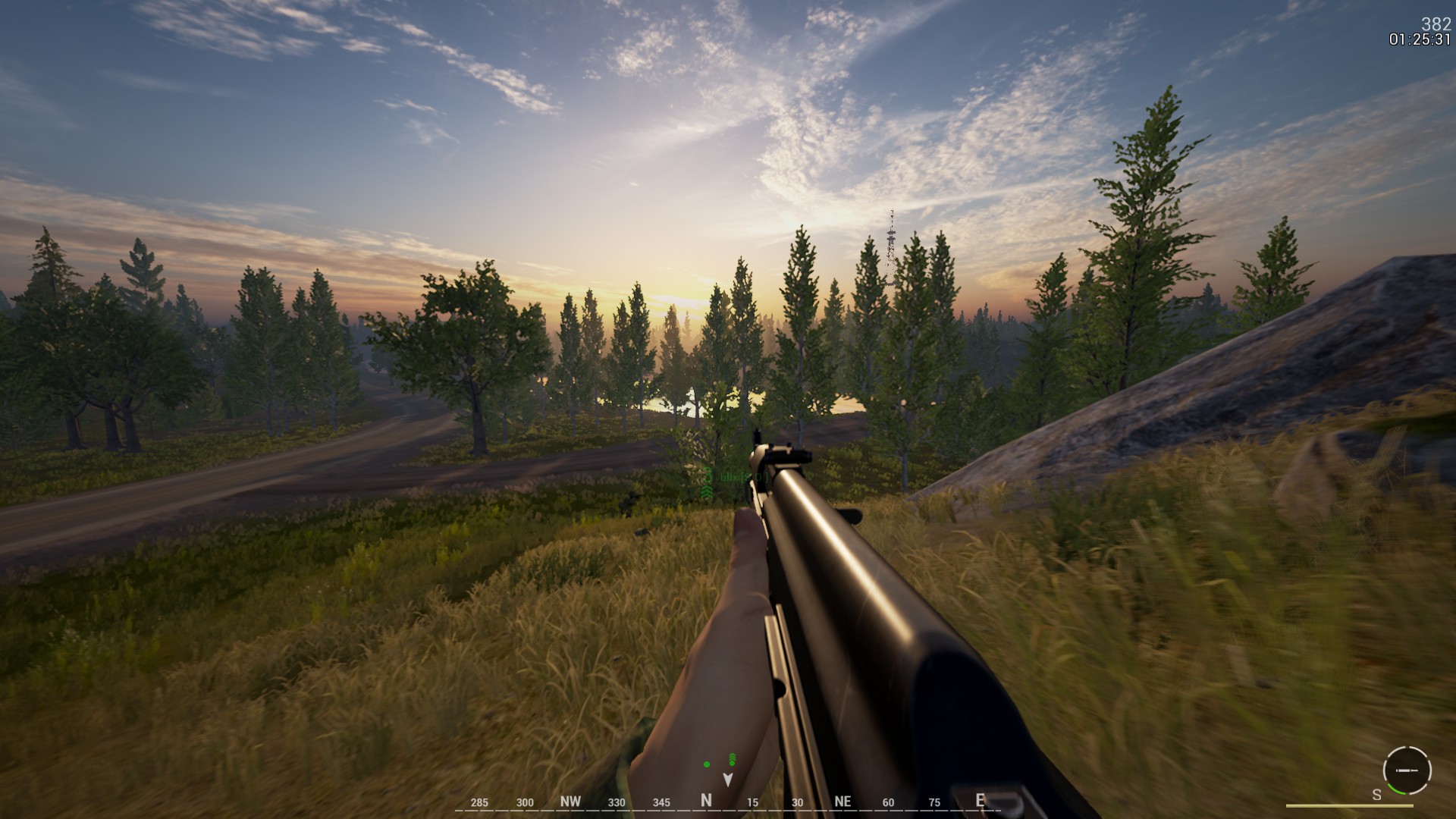Squad has grown into a deep military shooter
Though still in alpha, Squad continues to improve as a smart blend of Battlefield and Arma.

Hunkered in a small mud-walled compound, my squad waits with rifles pointed west. We've been getting our asses handed to us the entire game. We fall back, form new defensive positions, and eventually get routed to fall back again. We can't get help from the other squads, who are all off in the woods somewhere building tree forts or measuring rifles or whatever it is they do when they're not fighting on the objective.
Even though we're constantly retreating, I'm playing squad leader to a group full of good players. They're working together and following my directions. The Americans are marching us across the map, but we're making them pay for every inch of ground. A shout goes up. Smoke grenades are popping in the poppy fields to the west. They're coming at us again.
By the end of the game, my boys are calling me "Boss" and answering commands with "yes, sir." We lose the match badly, but my squad earns the highest unit score by a long mile. I log off, feeling ten feet tall.
We first checked in on Squad, which is being developed and played by a lot of the same community that made the Battlefield 2 mod Project Reality, last year. The game has changed a lot in a year, but Squad still aims to take that feeling of Battlefield 2 combat and expand it, stretching across bigger maps and stripping away the radar, name tags, and heads-up-displays.
The result is something between the speed of a flashy FPS and the grounded teamwork of a mil-sim like Arma 3. For me, taking away all of the assisting tech, like bullet hit indicators or enemy spotting highlights, makes every victory feel like more of an accomplishment. Aiming down iron sights and pulling off an impossible shot gives me a rush that I don't get from a high-powered scope. Throwing smoke and grenades into a compound, then clearing it room-by-room with friends at my back? That's resplendent.
The game refuses to give out extra information, so teammates are the only way to find the enemy and know where to go. When the team is that important, working as a medic to pick a wounded friend off the ground—explosions showering dust, rounds whistling past—makes me feel heroic in a way that other shooters don't.

Drive time
Vehicles joined the game in August, so now squads can load into troop transports and armored cars to move more quickly around the massive maps. In effect, this has made the world a little smaller. A distant back corner of a valley once felt safe because it was a ten-minute walk away from enemy lines, but now a full squad of angry guns is a short drive away.
Keep up to date with the most important stories and the best deals, as picked by the PC Gamer team.
The ability to move players fast has made teams more experimental in their strategy, and the game has gotten more unpredictable as a result. Now, an early convoy of Humvees could come screaming over a hill to attack your rear flank—even in the first moments of a game, when everyone is still trying to get organized. Once, as my squad walked through thick woods, laughing and chatting on our way to our first objective, we walked straight into a reinforced roadblock controlling a piece of road that had never seemed worth guarding before.
Vehicles brought with them a new approach to team logistics in Squad. A squad leader (SL) can stand near a member of their squad and drop a backpack—a Rally Point—a small, limited-use respawn position that can only be used by that squad. Good SLs place and replace Rally Points to keep reinforcements close to a fight. For a more established position, an SL grabs two squad members and drops a heavy radio, a Forward Operating Base that gives a respawn point to the entire team. Being near a FOB also lets players construct sandbags and drop ammo caches.

When a new FOB gets set up, it takes about five minutes to come online as a spawn point—unless a truck full of supplies is driven from the main base and unloaded. To properly construct a forward base full of bunkers and emplacements, base builders will need regular supply drops. Players are starting to experiment with dedicated logistics squads, players who spend the game supplying forward bases and protecting themselves from ambush on winding mountain roads.
Burdens of command
Since my first taste of glory last year, Squad has changed a lot in one specific direction: squad leaders are more important than ever. SLs have always been the heart of the squad—and of Squad, for that matter. They're the only players who can drop respawn points and place fortifications, mark objectives and intelligence on maps, and only SLs can voice chat with other squads to coordinate. For larger maps with 36 players and half a dozen squads on each team, SLs represent a vital source of information for players.
Those same abilities have expanded and become more critical. Instead of simple sandbags and ladders, SLs can install .50 caliber machine gun bunkers that suppress movement across entire valleys. An SL also has to sign out vehicles from the motor pool so their squad can use them. It's a brilliant solution to the classic Battlefield problem—you wait for an important vehicle to respawn, and then some jerk leaps into your helicopter, flies it into a mountain, and says "LOL oops."
Having a great SL is like having a boss you respect, a brother who looks out for you, and a dad who loves you. It's a credit to Squad's growing community that most SLs I've played with, even in random public matches, are at least pretty good. Still, so much of Squad's basic functions route through this single position of authority that it's a major vulnerability. Having an SL who can't make a plan or puts a respawn point in a stupid location cripples the unit and leaves the entire team under-strength. A bad SL has an oversized impact on other players' fun.
A great squad leader is like a boss you respect, a brother who looks out for you, and a dad who loves you.
In some ways, the work-in-progress logistics of Squad (which is still in alpha development) haven't kept pace with the growing community and increased importance of the SL role. For example, if an SL leaves—maybe they rage-quit or their game crashes—one of the remaining members is randomly promoted to leader without warning or notice. They don't even get the SL equipment loadout, so they can't perform many of the SL's functions. Occasionally, someone who is paying attention will have to inform the SL of their new job. Especially for new players, this sudden veneration can be daunting, and so it begins: "Anyone else want to be squad lead? Anyone?"
While this chaos may be a fair representation of what it's like to lose the chain of command in the middle of a fight, it's not fun to live through. One by one, a leaderless squad's members will filter out to join other squads. It's not uncommon to see a failing squad collapse and die, like the heat-death of a miniature tactical universe.
Growing pains
With all of these changes flowing into an active community, Squad's alpha has gone through some rough patches. In the weeks after the vehicle update, random fatal error crashes affected nearly everyone—causing a lot of SL disappearances and collapsing squads. Fortunately, this seems to have stabilized.
Some vehicles handle collisions unpredictably, and I've seen a small tree launch a fully-loaded armored car spinning through the air. For as active and competitive the community is, Squad is very much a work-in-progress.

The ever-changing game code is also vulnerable to cheaters who hack or exploit the game. This instability has had the largest impact on Squad's fledgling competitive esports scene, Squad League. After getting started last year, hosting regular clan matches and a tournament in March, the organizers of Squad League have put the project on hold and stepped back. While some jerk shooting your team through a wall is annoying in a pick-up game, the possibility of cheating has discouraged formal ranked play—for now.
Multiplayer shooters have given me a chance to walk in a lot of different roles—the sniper, the badass, the Rambo, the pilot—but I've never gotten a chance to be Sarge before. The SL in Squad is an intimate, empowering role that is a magnet for communal bonding. The strategy and logistics will keep changing, but the joy of Squad's moment-to-moment combat has been great since last year. Squad's community keeps growing through big development changes because the basic combat experience is unlike any other shooter online right now.

